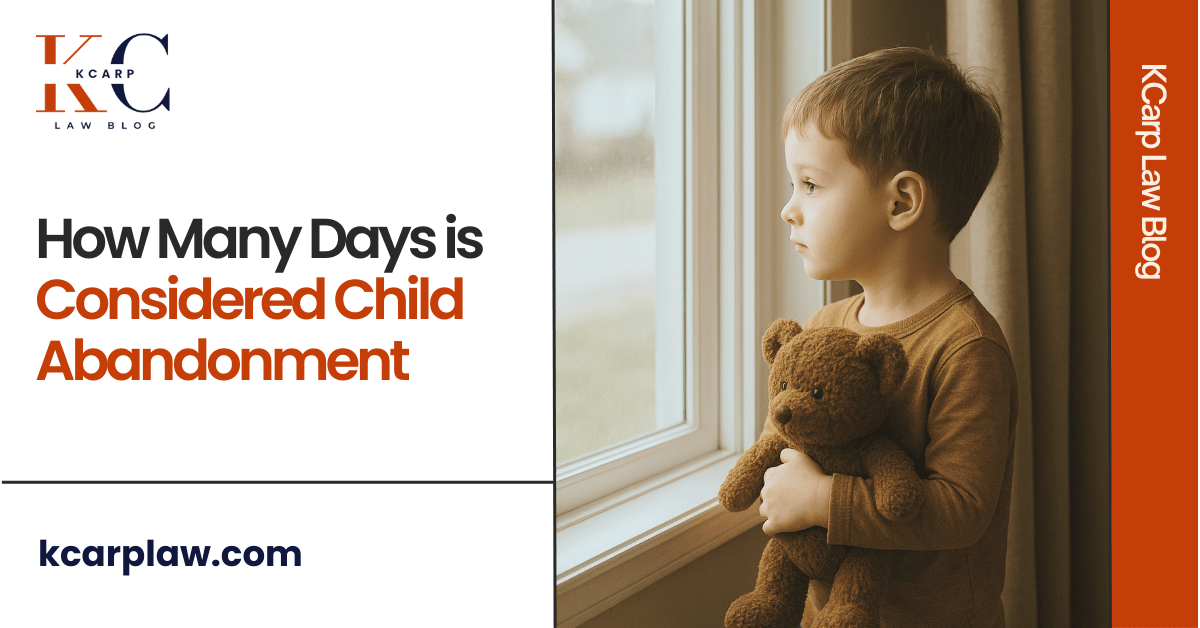Child abandonment is a heartbreaking issue that can leave children confused, frightened, and struggling with an uncertain future. It generally refers to a parent’s voluntary decision to leave a child without proper care, support, or a concrete plan to return. Many people want to know if there is a set number of days that qualifies as abandonment under the law.
In reality, abandonment is usually measured in months and accompanied by specific factors, such as a lack of financial support or communication. Courts focus more on the parent’s overall behavior rather than the exact number of days. Below, the local child custody attorney explains how laws vary, what to expect when alleging abandonment, and why seeking professional legal help is so critical when a child’s well-being is at stake.
What is Child Abandonment
Definition and Emotional Impact
Child abandonment happens when a parent deliberately severs ties with their child, leaving them without day-to-day care or emotional and financial support. It is more than just an unplanned absence—it usually involves an intent not to return or resume parental duties.
From an emotional perspective, children can suffer tremendous anxiety, fear, and a sense of rejection. The local family law attorneys recognize that each case is unique and may require both legal intervention and emotional support services to protect the child’s well-being.
Defining Child Abandonment By Law
Varying State Statutes
Different states have different legal definitions. Many states look for the same core elements:
-
No Financial Support: The parent is not paying for necessities such as food or shelter.
-
No Communication or Visits: The parent fails to maintain contact for an extended period.
-
Intent to Desert: Courts examine whether the parent truly intended to leave the child permanently.
Some laws specifically mention “leaving a child with no intent to return.” Others use more general guidelines. A compassionate child custody attorney can help interpret your local statutes and guide you through the process of proving abandonment if needed.
Safe Haven Exceptions
Most states also have “safe haven” or “Baby Moses” laws, which allow parents to give up a newborn at designated locations without being prosecuted for abandonment. These statutes usually apply only for the first few days or weeks of the child’s life. Beyond that window, leaving a child somewhere without ensuring proper care typically meets the legal standard of abandonment.
Key Timeframes: How Many Days Is Child Abandonment?
No Universal “Day Count”
Contrary to popular belief, there is no universal “10-day” or “30-day” rule that automatically defines abandonment. Many individuals assume that failing to see a child for a couple of weeks is enough, but courts typically require much more. In practice, states tend to consider an absence of several months before presuming a parent has truly walked away.
Examples by State
-
Texas: Roughly six months of no contact or financial support can qualify.
-
Florida: If the parent’s whereabouts remain unknown for at least 60 days, that may be sufficient grounds.
-
California: Abandonment can be found if a parent leaves a child with a non-parent for six months or the other parent for a year without support or communication.
-
Tennessee: One statute references 18 months without support for criminal charges. Yet, four months of willful non-support can be enough to terminate parental rights under family law provisions.
The experienced local child custody attorneys stress that these time periods vary. Even within a single state, different rules may apply in criminal court vs. family court. Judges generally look beyond the calendar to see whether the parent truly acted as though they wanted no future role in the child’s life.
Determining Abandonment In Court
Factors Courts Examine
-
Voluntary Separation: Did the parent choose to leave, or were there unavoidable circumstances (e.g., hospitalization)?
-
Support or Contact: Has the parent contributed financially, sent letters, or called?
-
Child’s Best Interests: Courts weigh how the parent’s absence impacts the child’s well-being, stability, and security.
The dedicated child custody attorney explains that a judge may rely on phone records, bank statements, social media posts, and witness testimony. Even incarceration does not automatically mean abandonment—if the parent makes genuine efforts to stay in contact and provide some support, courts may decide otherwise.
The Role of Intent
Intent is often the core question. If a parent moved away for a job but maintained phone calls, visited sporadically, and sent support checks, a court may not consider that abandonment. On the other hand, a parent who disappears entirely, offers no updates, and cuts off every form of communication suggests an intent to desert the child for good.
Examples Of Child Abandonment Cases
-
Infant Left Unattended: A parent places a newborn at someone’s doorstep and vanishes. This extreme scenario almost always leads to immediate legal intervention.
-
Long-Term No Contact: A father fails to pay child support or show up for visits for six consecutive months (or more) without explanation. The other caregiver may have grounds to file for abandonment.
-
Parent Leaves State with No Forwarding Address: A mother relocates to another region and never provides her new contact information, financial help, or visitation requests. Courts might interpret this as abandonment if it lasts beyond a few months.
-
Relatives Housing the Child Indefinitely: A parent drops off a child with grandparents “just for a short while” but never returns or offers any support. Over time, this can meet legal definitions of abandonment.
-
Incarceration Without Contact: If a jailed parent stops letters, phone calls, and financial support for a substantial period (often 15 out of 22 months in foster care cases), a court may conclude the child was effectively abandoned.
Each case can differ based on the child’s age, risk factors, and attempts the abandoning parent might have made to reconnect. The dependable family law attorney reviews the totality of the circumstances to see if a judge is likely to declare abandonment.
Legal Consequences
1. Criminal Penalties
Many jurisdictions treat abandonment as a misdemeanor or felony, especially if the child’s safety was endangered. Punishments can range from fines to jail or prison time. These penalties vary widely depending on how severe the risk or harm was.
2. Termination of Parental Rights
Perhaps the most significant consequence is the termination of parental rights. The dedicated local child custody attorneys note that once a parent’s rights are terminated, they lose all legal ties, including custody, visitation, and decision-making authority. The child becomes eligible for adoption by another adult, such as a stepparent or other family member.
3. Civil Family Court Orders
Even if the parent is not prosecuted criminally, a judge can rule that abandonment has occurred in a civil proceeding. This may lead to custody modifications granting sole custody to the other parent. Child support can also still be ordered, as financial obligations typically last until rights are formally ended.
What To Do If A Parent Has Abandoned A Child
Ensure Immediate Safety
The top priority is the child’s safety and stability. If the child is left in a dangerous situation, call the authorities or child protective services. A safe environment should be secured right away.
Gather Documentation
Record the dates and circumstances of the parent’s absence. Keep any messages, mail returned undeliverable, or screenshots showing that attempts at contact were ignored. Proof of no financial support—such as bank statements or missed child support payments—can also be crucial.
Seek Legal Guidance
Consulting the local family law attorneys is the best way to clarify your rights and the child’s best options. An attorney can help file a custody petition or a motion for termination of parental rights based on abandonment. They will advise you on whether you have enough evidence and what the court process entails.
Consider Filing for Termination
If the abandonment has been particularly long or harmful, the next step might be to permanently end the absent parent’s rights. This allows another person, like a stepparent, to adopt the child if that is desired. It can also give the child a sense of permanency and security.
Seek Emotional Support
Abandonment is not just a legal matter—it’s deeply emotional for the child and the remaining caregiver. Counseling or family support services can help children cope with feelings of loss or confusion. The supportive family law attorneys often encourage parents to find these resources as part of a holistic approach.
Child Abandonment Vs. Neglect Vs. Endangerment
Willful Desertion vs. Failure to Provide
“Abandonment” usually refers to a parent’s complete withdrawal from the child’s life, while “neglect” can include remaining in the child’s life but failing to meet daily needs. Neglect might involve insufficient food, hygiene, or medical care, even if the parent is still present in some capacity.
Active Risk to the Child
Endangerment focuses on placing a child in a harmful situation. This might include leaving them alone in a car on a hot day or exposing them to dangerous living conditions. Sometimes one act can be labeled both neglect and abandonment if a parent disappears and fails to secure safe, consistent care for the child.
SAFE HAVEN LAWS
Protection for Newborns
Nearly every state has enacted a “safe haven” law permitting a parent to safely surrender a newborn—often under 7 to 30 days old—at an authorized location. This typically includes hospitals, fire stations, or police stations. The parent can hand over the baby without fear of criminal charges, provided they follow the specific guidelines.
Not a Blanket Solution
Safe haven laws do not usually apply to children older than the specified newborn window. If a parent abandons an older infant or child, they may still face abandonment charges. The experienced local child custody attorney can clarify how these laws function in your jurisdiction.
Special Situations
Incarcerated Parents
A prison sentence alone does not always equate to abandonment. Courts examine whether an incarcerated parent makes an effort to communicate or support the child. If an incarcerated parent fails to reach out at all for an extended period, it can still be considered abandonment.
Disappearance Across State Lines
If a parent moves away and does not provide any address or phone number for months, that may meet the abandonment standard in certain states. The extended absence without efforts to contact or contribute is what matters.
Military or Medical Absence
Deployment or hospitalization may not constitute abandonment if the parent continues trying to keep in touch or support the child. Judges often look at documented attempts to be involved in the child’s life, even if physical presence is temporarily impossible.
CONCLUSION
Child abandonment is a serious matter that can lead to criminal penalties, termination of parental rights, and long-lasting emotional harm for the child. While many parents ask how many days define abandonment, the law typically focuses on months of no contact or support, combined with a clear lack of intent to return.
These cases demand careful handling and empathy. The local child custody attorneys emphasize that caregivers concerned about abandonment should collect evidence, prioritize the child’s safety, and consult a legal professional to determine the next steps. When a child is abandoned, legal remedies can help secure a stable environment and brighter future for them.

